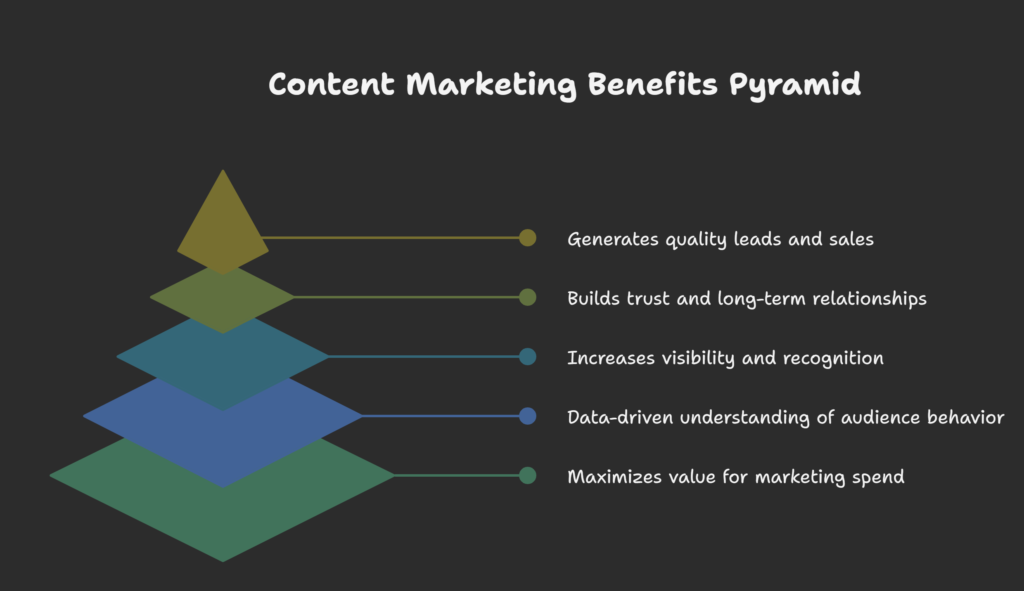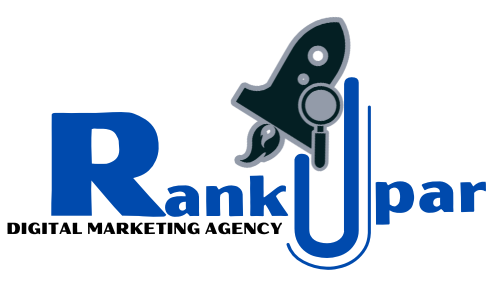+91 8828215493

In today’s dynamic digital landscape, content marketing has emerged as a powerful and indispensable strategy for organizations aiming to connect with potential customers and foster sustainable growth. Far beyond mere promotional efforts, content marketing focuses on creating and distributing valuable, informative, and engaging content that addresses an audience’s questions and needs, thereby establishing a foundation of trust and relationship-building. This approach consistently proves its worth, influencing audience decision-making more profoundly than many other techniques. This article delves into the primary benefits that underscore the strategic importance of content marketing.

1. Enhancing Conversions and Generating Quality Leads
One of the most direct and tangible benefits of content marketing is its capacity to increase conversions and generate high-quality leads. By providing clarity and reassurance, great content equips individuals with the information necessary to advance in their buyer’s journey, whether that involves subscribing to a newsletter, requesting a product demonstration, or making a direct purchase. For instance, a retailer offering comprehensive informational content—such as setup guides, troubleshooting tips, customer support details, and reviews—is significantly more likely to convert a hesitant shopper than one providing only basic product specifications. Content serves as an effective conduit to guide users to landing pages, where well-placed calls-to-action (CTAs) encourage further engagement, turning delighted visitors into valuable leads for sales teams.
2. Cultivating Trust, Strengthening Relationships, and Fostering Loyalty
Content marketing is fundamentally about consistently attracting and engaging customers, leading to the strengthening of customer relationships and the cultivation of loyal brand advocates. When businesses provide value without immediately seeking a return, their audience develops trust in their advice and recommendations. This trust is paramount, as research indicates that 95% of buyer decision-making occurs in the subconscious mind, meaning emotional connections are powerful drivers of sales. Effective brand storytelling, delivered through various content forms like blog posts, social media updates, and case studies, can deeply resonate with an audience by showing empathy, offering a unique perspective, maintaining authenticity, and ensuring consistency in messaging and tone. Such efforts lead to customers feeling connected to a brand, boosting its reputation and fostering long-term loyalty.
3. Amplifying Brand Awareness and Online Visibility
For both established and nascent companies, content marketing is a cornerstone for growing brand awareness and increasing visibility. High-quality, search-optimized content naturally leads to higher rankings in search engine result pages (SERPs), making a business more discoverable to potential customers. Beyond search engines, valuable and interesting content inspires word-of-mouth recommendations, a profoundly influential channel given that 88% of consumers trust referrals from people they know. Engaging content, particularly on social media platforms, can significantly expand an audience reach, generating widespread positive mentions and increasing followers. This “Surround Sound” strategy ensures a brand’s content appears wherever potential customers seek information related to its products or services.
4. Establishing Industry Authority and Expertise
Consistent production of well-informed, product- and industry-related content positions a company as an authority and expert in its field. Demonstrating expertise instills trust, which an Edelman study found to be more effective than love at driving sales, with 61% of consumers advocating for brands they fully trust. To achieve this, content must be useful, solving the audience’s biggest challenges, and thought-leading, offering unique perspectives on industry topics. Businesses that serve as credible sources of information are not only trusted by customers but also favored by search engines, leading to higher rankings.
5. Driving Website Traffic and Optimizing SEO Performance
Helpful, SEO-driven content is a primary magnet for attracting potential customers to a website. Google’s algorithms prioritize connecting searchers with the most relevant and high-quality information, meaning that businesses focusing their inbound marketing efforts on audience needs are likely to rank higher, draw more clicks, and achieve greater engagement. Case studies, such as Voe Tranquilo increasing organic traffic by 588% and reducing customer acquisition costs by 66.5%, illustrate the profound impact of high-quality, search-optimized content on website traffic and revenue. Every new piece of content adds another indexed page, expanding opportunities for higher search engine rankings.
6. Engaging Ad-Wary Audiences
A significant challenge for modern marketers is reaching audiences who actively avoid advertisements. Content marketing provides an effective solution by allowing businesses to connect with ad-wary audiences. A substantial portion of consumers, particularly younger demographics like Gen Z (99% skip ads, 63% use ad blockers), prefer authentic voices over overt advertisements. By building a rich repository of useful, search-optimized content, businesses can organically capture the attention of these consumers who distrust or disengage with traditional ads, complementing paid strategies for optimal returns.
7. Maximizing Cost-Effectiveness
While initial investment in content creation might seem substantial, content marketing stands out as a highly cost-effective marketing strategy in the long run. Compared to ongoing media placement costs associated with paid advertisements, video marketing, or traditional campaigns, much of content marketing work can be done in-house, significantly keeping overall marketing costs down. Its ability to attract and retain customers by establishing credibility further enhances its long-term financial efficiency.
8. Gaining Data-Driven Insights into Your Audience
Content marketing is not merely a broadcast mechanism; it is a powerful tool for learning about your audience. By tracking engagement metrics through analytics tools like Google Analytics, businesses can gain a clear picture of their target demographic. Data reveals how people find content, their time spent on pages, device preferences, and demographic profiles. This data-driven insight enables marketers to refine future content strategies, ensuring greater relevance and effectiveness in targeting the right people. For example, observing that short blog posts with embedded videos drive more conversions might prompt an increased focus on video-based content.
9. Elevating Customer Experiences and Streamlining Service
Educational and actionable content plays a crucial role in enhancing customer experiences and easing the pressure on customer service teams. By proactively answering high-level and common questions through articles, videos, and support hubs (like Expedia’s), customer service staff are freed to address more complex inquiries and deliver personalized services. This empowerment of the audience to make informed decisions and understand products or processes reduces misunderstandings and friction, leading to positive reviews, word-of-mouth recommendations, and repeat purchases. Consumers are even willing to pay more for products when confident of an outstanding experience.
10. Streamlining the Sales Process and Guiding the Buyer’s Journey
Content marketing effectively streamlines the sales process by providing valuable resources that sales teams can leverage to convert leads more efficiently. Case studies, for example, offer real-world examples of product efficacy without the need for ad-lib storytelling, while polished demonstration videos can engage busy leads. Moreover, content marketing uniquely allows businesses to meet their audience at every stage of the buyer’s journey—Awareness, Consideration, and Decision. A potential customer, initially seeking solutions to a problem (Awareness), can be guided through research (Consideration) and ultimately to a purchase decision (Decision) by a consistent stream of relevant and helpful content, establishing the business as a trusted partner throughout.
Conclusion
The strategic adoption of content marketing offers a comprehensive suite of benefits, ranging from bolstering brand awareness and authority to driving conversions and enhancing customer loyalty. While the benefits may not always be immediate, requiring a period of trial and error and sustained effort, the long-term impact on a business’s growth, engagement, and retention is undeniable and substantial. By prioritizing high-quality, consistent, and audience-focused content, businesses can build a robust online presence, foster deeper connections with their customers, and ultimately secure a stronger position in their respective markets.
For any further questions about content marketing, or to discuss how these strategies can benefit your business, please don’t hesitate to contact us.
Share on Instagram



